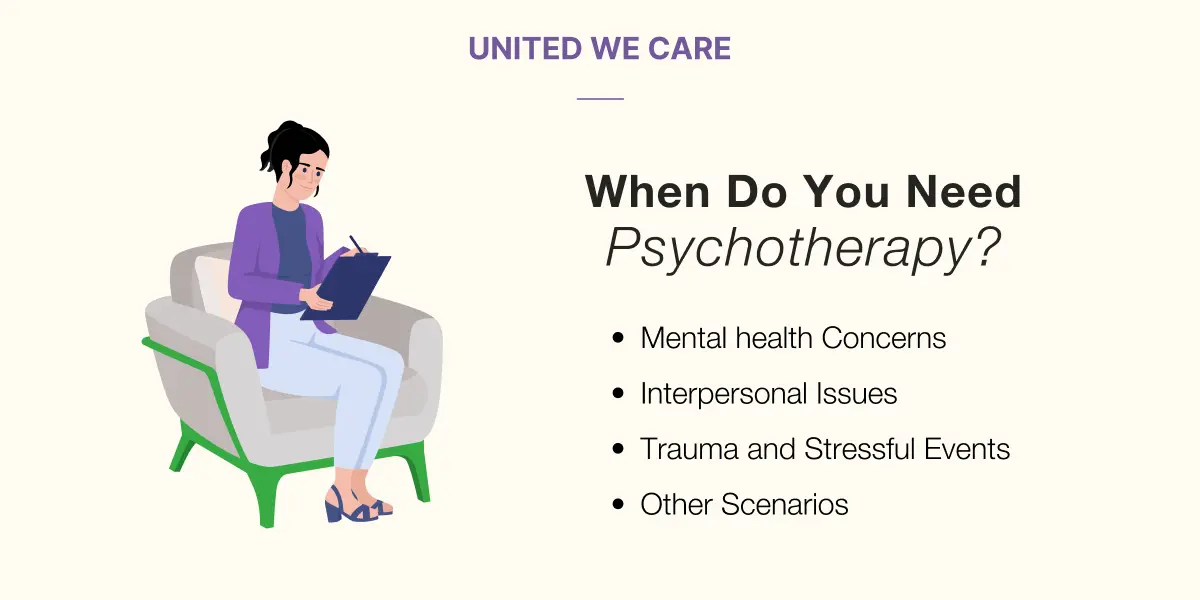Introduction
Essentially, psychotherapy is any form of talk therapy that helps in dealing with mental health issues. Within psychotherapy, there are several different types created on the basis of psychological theories and mental health issues. Without a doubt, most psychotherapies have their origin in the works of Sigmund Freud, who came up with psychoanalysis.
In the same way that psychoanalysis was developed, it was further refined into modern-day psychoanalysis, which is known as dynamic psychotherapy. Dynamic psychotherapy and Psychodynamic therapy are used interchangeably to refer to the refined version of traditional psychoanalysis. Let’s dive into everything you need to know about dynamic psychotherapy.
What Is Psychotherapy?
In order to learn more about dynamic psychotherapy, let’s first understand what psychotherapy is and how it helps us. The main premise of psychotherapy is the conversations that take place between the patient and a mental health professional(psychiatrist, psychologist, etc). The goal of psychotherapy is to bring change into thoughts, emotions, and behavior that are dysfunctional because of mental health issues.
In recent years, psychotherapy has branched into several different types, ranging from behavioral therapy to solution-focused therapy. Despite this broad range of therapies, psychodynamics remains a popular format. Several psychotherapists continue to use psychodynamic therapy with promising results.
Precisely, dynamic therapy refers to the process of identifying the underlying processes of the mind that lead to certain thoughts, behaviors, and actions. Through the process of talk therapy, the therapist tries to delve deeper into the motivations, beliefs, and cognitions behind why a certain mental illness originated and how it can be resolved.
Benefits of Psychotherapy
Without a doubt, there are several benefits to undergoing therapy.
- The process of psychotherapy can bring positive change and aid individuals in different ways.
- Due to its subjective nature, the benefits can vary from person to person.
- Above all, the most important benefit of psychotherapy continues to be the management of mental illnesses and conditions associated with mental health.
- Besides the clinical benefits of psychotherapy, there are several areas of life in which psychotherapy can create positive change.
- Undergoing therapy for problems in social and professional life can help you function better in these areas.
- Alongside, dysfunctions or conflicts between family members, couples, or partners can also be resolved with the help of psychotherapy.
- Above all, without any dysfunction or mental health concerns, many individuals undergo therapy to understand themselves better.
- Some have found the existential and spiritual forms of psychotherapy help get answers.
Basically, psychotherapy is the best way to understand and answer any and every question related to the self.
When Do You Need Psychotherapy?
As mentioned above, there are far-reaching benefits of psychotherapy. Although no prescribed time tells you when you should consider undergoing therapy, there are some signs and situations that indicate a need for professional help. Let’s discuss this in detail below.

Mental health Concerns
Firstly, psychotherapy pertains to the use of psychological principles to aid in mental health-related troubles. This includes managing symptoms and using relaxation and other skills to rehabilitate and prevent further relapse. If you or anyone you know seems to be struggling with stress, uncontrollable thoughts, and issues in functioning, psychotherapy can be beneficial for you.
Interpersonal Issues
Secondly, due to unhealthy communication patterns, you will come across issues in maintaining friendships and relationships. Sometimes, this originates from the nature of your family or partner. To address these concerns on your own or with your loved ones, psychotherapy can provide a neutral and guided space to heal.
Trauma and Stressful Events
Thirdly, invariably, we come across abusive relationships, accidents, and injuries that leave an impression on us. These events can unfold into fears and insecurities that create issues in our social and professional lives. In some cases, they end up with mental illnesses. Through psychotherapy, you can identify how these events have created difficulties in your life and how to change them.
Other Scenarios
Finally, along with the above-mentioned concerns, there are situations in our day-to-day lives that can cause us to need guidance. Scenarios such as vocational confusion, a troubled workplace, financial difficulties, etc., can also lead us to question ourselves and look for a safe space to get relief. In such scenarios, psychotherapy can help you bring a better perspective to otherwise troubling situations.
Elements Of Psychotherapy
As discussed above, there are several ways in which psychotherapy can be needed for an individual. Particularly, psychodynamic therapy is a relatively shorter version of psychoanalysis. As compared to psychoanalysis, dynamic psychotherapy takes up specific concerns and dives into detail as to where and how they have developed. This includes various components. Let’s discuss some of the key components.
Early Life And Childhood
One of the main components of both traditional psychoanalysis and dynamic psychotherapy relies on the emphasis on early childhood years. Freud believed that the first few years of life are integral to the development of the personality and the mind. If the early years are troublesome or stressful, they lead to personality issues in adulthood. Hence, dynamic psychotherapy focuses on how the formative years of childhood have shaped your personality as an adult.
Unconscious Aspects
Additionally, there are certain beliefs, fears, and thoughts that get repressed in the mind because of how difficult they are to bring to awareness. This happens automatically, and most individuals have early repressed memories of troubling scenarios. However, sometimes, these situations are deeply disturbing and affect other aspects of the mind. Dynamic psychotherapy specifically works on uncovering the unconscious motivations behind behavior.
Empathy and Free Associations
An integral component of any form of psychotherapy is an empathetic therapist. The therapist ensures that you have a safe space to discuss and address your most vulnerable aspects. By giving you space and a listening ear, the therapist helps you freely discuss and discover your unconscious motivations and desires.
Finding a Psychotherapist
Above all, the process of psychotherapy is incomplete without a therapist. It is essential that the psychotherapist that you reach out to is trained and licensed in dealing with psychotherapy. Moreover, look for a therapist with experience in dynamic psychotherapy before beginning the sessions. Below are some of the ways that you can find a psychotherapist appropriate for you.
- Through Referral – Reach out to your local hospitals and clinics and look for healthcare professionals who can refer you to a psychotherapist nearby.
- Online – A quick search on the search engines will give you a list of practicing professionals working online through video calls and online meetings.
- Local and In-Person – Consider searching for local mental health clinics and establishments near you to find therapists who take sessions in person.
- Reaching Out – Despite other methods, if you still struggle to find a psychotherapist, consider reaching out to a loved one. You can also reach out to social workers to help you find the appropriate help.
Conclusion
Overall, dynamic psychotherapy has its origins in conventional psychoanalysis developed by Freud. Unlike psychoanalysis, dynamic therapy is shorter and works on specific issues. A psychotherapist is needed to help you deal with mental health concerns and interpersonal issues as well as process traumatic scenarios. Dynamic psychotherapy utilizes unconscious aspects that get repressed in early childhood and disturb your mind as an adult. To find adequate psychotherapists and other healthcare professionals to help heal your mental health, reach out to United We Care.
References
[1] D. L. Wolitzky, M. Eagle, and L. Luborsky, “Dynamic Psychotherapy,” Advanced Abnormal Psychology, pp. 543–561, 2001, doi: https://doi.org/10.1007/978-1-4419-8497-5_25.
[2] J. P. Becker, R. Paixão, S. Silva, M. J. Quartilho, and E. M. Custódio, “Dynamic Psychotherapy: The Therapeutic Process in the Treatment of Obsessive-Compulsive Disorder,” Behavioral Sciences, vol. 9, no. 12, p. 141, Dec. 2019, doi: https://doi.org/10.3390/bs9120141.









